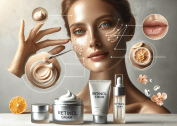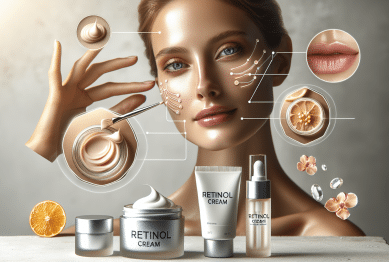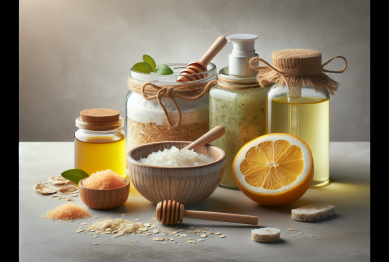Uncover what science says about collagen for skin. Find out how different collagen sources, peptides, and daily habits could impact beauty, elasticity, and the signs of early aging—straight from research, not promises.
Understanding Collagen and Skin Structure
Collagen is one of the most important proteins in the body, making up about 75% of skin’s dry weight. It gives skin its structure, strength, and a youthful bounce many seek in skincare. Collagen is produced naturally by cells called fibroblasts, though levels can decrease with factors like age, sun exposure, stress, and nutrition. As collagen declines, wrinkles, sagging, and dryness often become noticeable. Understanding this natural protein shows why so many beauty supplements and topical products mention boosting collagen for improving overall skin appearance (Source: https://www.ncbi.nlm.nih.gov/pmc/articles/PMC3583892/).
The structure of collagen is complex. It forms triple-helix fibers that anchor the skin’s dermal layers, keeping the surface plump. Loss of collagen is linked not only to wrinkles but also thinner skin that bruises more easily and heals more slowly. Research highlights that environmental factors such as UV rays can speed up the breakdown of collagen in the skin, making daily sun protection a deeply influential part of any beauty routine. Considering collagen’s role in elasticity explains why both topical products and ingestible supplements focus on this single protein (Source: https://www.ncbi.nlm.nih.gov/pmc/articles/PMC2699641/).
Genetics, hormones, and lifestyle also guide collagen’s story. For example, estrogen can increase collagen production, while factors such as smoking or poor diet can diminish it. Understanding these underlying layers helps uncover why skin behaves a certain way throughout life. This context guides choices individuals might make about nutrition, sun safety, and even stress reduction to help foster skin health from the inside out (Source: https://www.aad.org/public/everyday-care/skin-care-basics/nutrition/collagen).
Collagen Peptides: Supplements or Just Hype
Collagen peptides are a frequently mentioned solution in beauty and wellness circles. These are short chains of amino acids made by breaking down larger collagen molecules, usually from animal sources like fish or cows. The idea is that they’re easier to absorb, promising improved elasticity and smoother skin. But, skepticism exists—can ingesting collagen peptides really influence the skin directly? Various clinical trials report mixed outcomes, with some improvements in hydration and minor wrinkle reduction, though not everyone sees dramatic results. The buzz is real; the science is emerging (Source: https://www.ncbi.nlm.nih.gov/pmc/articles/PMC6835901/).
Some research suggests that regular use of oral collagen peptides could support the body in replenishing lost collagen by providing readily available building blocks. This may translate to increased skin moisture and even modest boosts in elasticity. Yet, benefits often depend on dosage, bioavailability, and, ultimately, unique individual factors. Dermatologists recommend caution, noting supplements can complement a sound diet but aren’t a substitute for overall skin health supported by a varied diet and sun protection. Collagen peptides hold promise, but they are one piece of a larger picture.
The marketing for these supplements is everywhere, but their regulatory oversight is limited. As with any ingestible product, it’s important to choose reputable brands with third-party testing and published research. Peptides are generally safe, but they can’t replace the benefits of an overall balanced approach—think antioxidant-rich foods and well-established skincare routines. Collagen from supplements is different from the body’s natural production, so expectations should be balanced with solid information and clinical data.
Natural Ways to Support Your Collagen Levels
Many people wonder: Is diet enough to make a difference? Nutrition plays a significant role in supporting natural collagen production. Ingredients like vitamin C, zinc, and copper are essential for the body’s synthesis of collagen. Foods such as citrus fruits, berries, nuts, leafy greens, and even bone broth may help provide the necessary building blocks for the body to create more collagen. Paying attention to consistent, nutrient-rich meals may offer lasting skin-support benefits (Source: https://www.hsph.harvard.edu/nutritionsource/vitamin-c/).
Daily habits matter. Wearing sunscreen regularly, avoiding tobacco, and limiting excessive sugar intake have all been shown to slow the breakdown of natural collagen. Exercise may also play a supporting role, as physical activity increases blood flow and nourishment to skin tissue, aiding both healing and resilience. A holistic approach that looks at movement, environment, and rest is often most effective in supporting skin’s essential protein reserves. Sometimes, small daily choices collectively make all the difference.
Hydration is another core factor. Proper water intake can improve the skin’s elasticity and plumpness, making fine lines less noticeable. Collagen works in concert with other skincare components—such as elastin, hyaluronic acid, and lipids—to create an optimal environment for youthful-looking skin. Focusing on a healthy skincare routine, a diet high in antioxidants, and good hydration habits provides a sensible foundation for maintaining strong natural collagen production over time.
Topical Collagen: Myth or Meaningful
With topical creams and serums advertising collagen among their key ingredients, it’s natural to wonder what impact these formulations really have. Collagen molecules are generally too large to penetrate the skin deeply, so their effects may be limited to hydration rather than rebuilding deeper tissue. What most creams actually do is help the uppermost layer of skin (the stratum corneum) retain moisture, leading to a smoother, softer appearance without necessarily boosting long-term structural changes. Choosing formulations with small peptides or ingredients supporting the skin’s own production, like retinol or peptides, might yield more effective results.
Some skincare experts highlight that topical applications with antioxidants, vitamins, and mild acids can stimulate fibroblasts—the cells that make collagen—in the deeper layers, even if supplemental collagen itself doesn’t reach beneath the surface. Consider products containing vitamin C, niacinamide, or peptides that support skin repair and fortification. The science behind these ingredients continues to evolve, but their capacity to guard against oxidative stress and photoaging is well-documented.
While topical collagen might not rebuild underlying dermal layers directly, these products can offer short-term benefits for skin texture, softness, and moisture retention, making them popular in beauty routines. Always look for products with peer-reviewed evidence or recommendations from dermatologists. And remember: nothing replaces daily sun protection—SPF remains the gold standard for long-term defense against collagen loss and early signs of aging caused by sun exposure.
Lifestyle Factors That Impact Collagen
Stress, lack of sleep, and environmental pollutants are often overlooked but can play important roles in collagen degradation. Chronic stress increases cortisol levels, and high cortisol may interfere with normal collagen formation. Sleep quality is equally vital—nighttime rest is when the body does most of its repair work, including building new collagen. Having a regular, restorative sleep schedule should be part of any wellness and beauty regimen seeking youthful, healthy skin over time (Source: https://www.sleepfoundation.org/physical-health/how-sleep-affects-your-skin).
Air pollution, especially in dense urban environments, exposes the skin to free radicals that damage collagen and accelerate the formation of wrinkles. Cleansing routines that remove particulate matter, paired with barrier creams or antioxidant serums, help limit these effects. Additionally, managing daily stress through mindfulness, yoga, or breathing exercises can support the body’s ability to defend and repair skin, encouraging more sustainable beauty results.
Combining positive lifestyle practices—adequate hydration, stress management, targeted nutrition, exercise, and sleep—gives skin the resources it needs to thrive naturally. These sustainable habits, though sometimes overlooked, have the most consistent and lasting impact on maintaining collagen health and overall appearance, in contrast to quick-fix trends or overhyped miracle products.
The Future of Collagen in Wellness and Beauty
Advances in biotechnology are leading to innovative solutions, such as vegan collagen alternatives made from genetically engineered yeast or bacteria. This new wave of research reflects rising demand for plant-based beauty and environmentally sustainable options in skincare. While these alternatives are still undergoing clinical evaluation, they may provide future options for people looking to support their collagen without using animal-derived products. Expect more breakthroughs in personalized skincare as research continues to grow (Source: https://www.healthline.com/nutrition/vegan-collagen).
Genetic testing may soon offer more insights into how your body produces and maintains collagen, potentially allowing for custom routines tailored to unique biology. Big data and AI are also entering the beauty world, helping analyze ingredients, efficacy, and personalized needs to make products smarter and more effective for individual users. Some skincare clinics even offer advanced treatments—like micro-needling or light therapy—that can stimulate natural collagen, overseen by dermatologists for safety and proven results.
Staying informed about reputable research, practical routines, and the relationship between diet, lifestyle, and topical ingredients gives a strong foundation for future choices. As collagen science evolves, embracing both timeless habits and emerging technology offers the best outlook for healthy, resilient, and radiant skin—without relying on hype or overpromising claims.
References
1. Proksch, E., Schunck, M., Zague, V., Segger, D., Degwert, J., Oesser, S. (2014). Oral intake of specific bioactive collagen peptides reduces skin wrinkles and increases dermal matrix synthesis. https://www.ncbi.nlm.nih.gov/pmc/articles/PMC6835901/
2. Santucci, A., Beccafico, S., Borgogni, E. (2008). The Chemistry of Collagen. https://www.ncbi.nlm.nih.gov/pmc/articles/PMC2699641/
3. Baumann, L. (2007). Skin ageing and its treatment. https://www.ncbi.nlm.nih.gov/pmc/articles/PMC3583892/
4. American Academy of Dermatology Association. (n.d.). Collagen: Nutrition & Skin. https://www.aad.org/public/everyday-care/skin-care-basics/nutrition/collagen
5. Harvard T.H. Chan School of Public Health. (n.d.). Vitamin C: Fact Sheet for Consumers. https://www.hsph.harvard.edu/nutritionsource/vitamin-c/
6. Sleep Foundation. (n.d.). How Sleep Affects Your Skin. https://www.sleepfoundation.org/physical-health/how-sleep-affects-your-skin









